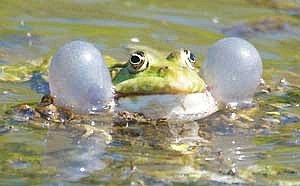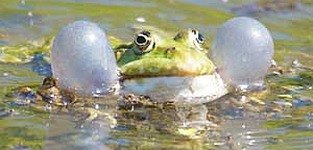August 2017 - Sussex Wildlife Trust - Marsh Frogs
August 24th, 2017 Marsh Frogs: Laughing all the way to the riverbank
Marsh Frogs: Laughing all the way to the riverbankA summer evening stroll past the damper areas in the east of our county is not for the paranoid or insecure. You could be mistaken for thinking that the very marshes, ditches and ponds are mocking you as an incredible quacking, cackling chorus fills the air growing more and more hysterical. This is the song of the marsh frog.
The frogs, hidden from sight, inflate two vocal sacs making them look like they are blowing bubble-gum out of their ears. Guttural guffaws are amplified by these sacs and broadcast. Their loud laughter is contagious. Once one frog proudly proclaims his place in the pond with a raucous whoa-aa-aa-aa his neighbour is compelled to respond and soon the entire marsh is whoa-aa-aa-aa-ing like a bawdy comedy night at a working man’s club. Holding the title of Europe’s largest frog the marsh frog is 50% bigger than Britain’s native common frogs. Full grown adults are a reassuringly Kermit-like green.
Unlike our native frogs they never stray too far from water. Marsh frogs are either in it, on it or sat close to it. They are alert and wary and, as you approach, these acrobatic amphibians will launch themselves into the air and belly flop with a plop into the water. But sit still by the water’s edge and inquisitive bulging eyes will soon reappear at the surface. Their wariness is warranted. Herons, egrets and grass snakes prowl the ditches hoping for a frog in their throat.
Marsh frogs are only found in a few places in Britain and East Sussex is a hot spot for this cold-blooded animal. But they shouldn’t be here. These green-skinned aliens have been introduced by man. Or, to be more precise, Mr E.P Smith of Stone-in-Oxney, Kent. Mr Smith, Conservative MP for Ashford, seems to have had a very tolerant and progressive view towards immigration and released twelve of these Hungarian marsh frogs into his garden pond in 1935. It wasn’t long before the warty dozen had multiplied and, by the 1960s, all of neighbouring Romney Marsh rang with the sound of laughter.
From there it was just a short hop into Sussex and over the decades the march of the marsh frog has continued, sometimes ‘helpfully’ assisted by humans. One Sussex herpetologist, in order to study them closer, moved some marsh frogs one Friday afternoon from Lewes to his suburban Burgess Hill garden pond. On Monday morning he was served a noise abatement order by the council. They don’t tolerate laughter in Burgess Hill. Marsh frogs will also respond to human laughter so, if you fancy a laugh, head to the marshes. Smile and the world smiles with you. Laugh and a marsh frog laughs at you.
www.sussexwildlifetrust.org.uk
by Michael Blencowe of the Sussex Wildlife Trust
Sussex Wildlife Trust is a registered charity caring for wildlife and habitats throughout Sussex. Founded in 1961, we have worked with local people for over half a century to make Sussex richer in wildlife. We rely on the support of our members to help protect our rich natural heritage.
Please consider supporting our work. As a member you will be invited to join Michael Blencowe on our regular wildlife walks and also enjoy free events, discounts on wildlife courses, Wildlife magazine and our guide book, Discovering Wildlife in Sussex. It’s easy to join online at www.sussexwildlifetrust.org.uk/join or by phone on 01273 497532.
Comments (0)
No comments have been submitted yet.Why not be the first to send us your thoughts
Leave A Comment
Thank you for your comments, they will appear shortly once approved.
Recent Posts
Have You Seen...






